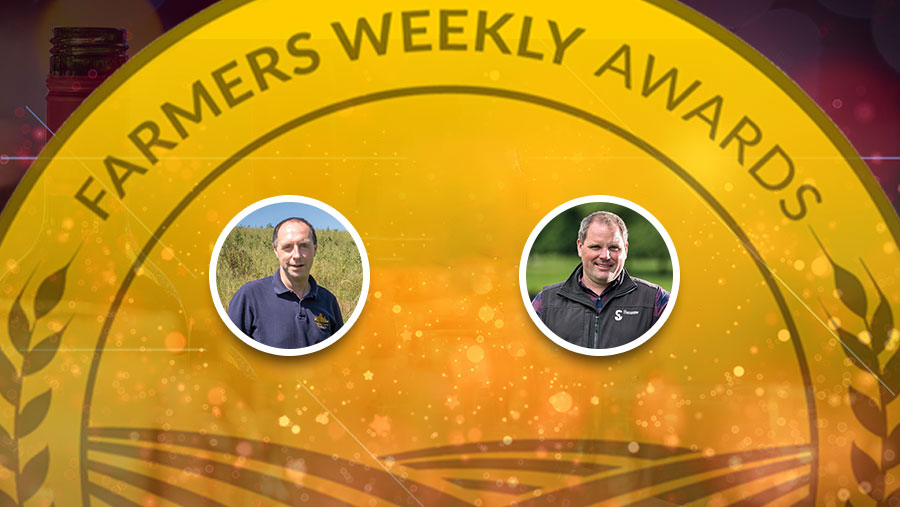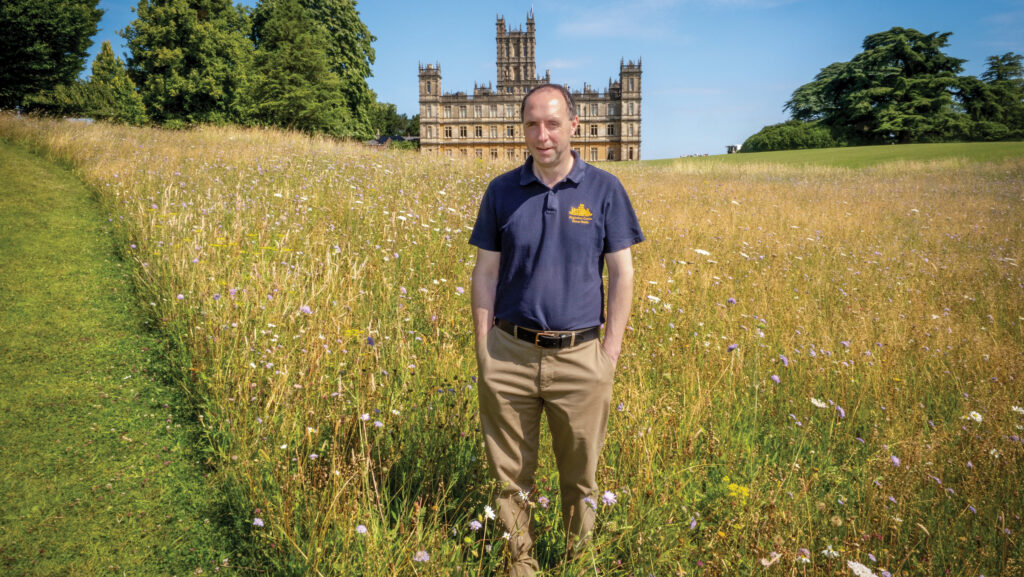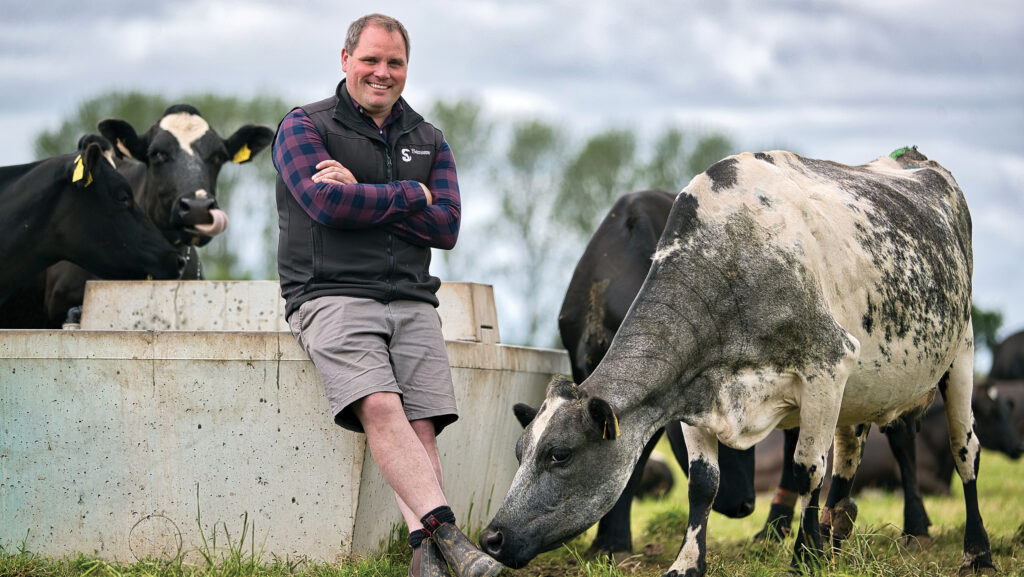Farmers Weekly Awards 2024: Farm Manager of the Year finalists

This year’s finalists run very different businesses, both demanding a wide range of skills, including the ability to adapt in sometimes challenging circumstances.
See more: Farm business tips from Farmers Weekly Award winners
Finalists
- Simon Andrews, Porchester Farms, Berkshire
- Breiffni Daly, Sansaw Dairies, Shropshire
The judges
Richard Price With many years of farm management experience, Richard now runs an independent consultancy, Ewematter, providing succession and business planning advice
William Haupt FW’s 2023 Farm Manager of the Year, William manages the Woburn Estate’s 1,880ha farming business plus a large contract farming acreage
Suzie Horne Farmers Weekly business editor since 2011 and former deputy editor of Big Farm Weekly
Simon Andrews, Porchester Farms, Newbury, Berkshire

Simon Andrews © Kathy Horniblow
Simon Andrews farms in a picturesque but challenging landscape, with exposed high ground, thin soils and steep slopes.
The much-visited Highclere Castle is at the centre of the estate, so the farming, and particularly the grazed parkland, is constantly in the public eye.
Simon originally joined as assistant manager, taking on the manager role almost seven years ago, tasked with reducing costs alongside building up the Highclere Castle Horse Feeds business.
The 1,400 ewe flock has seen a complete change of breed, from North Country Mules and Suffolks to NZ Romney cross Lleyn, and a move to outdoor lambing, except for triplets, with permanent staff replacing contractors.
“Our intensive indoor lambing flock was seriously underperforming,” says Simon.
“We went on a thorough investigation – blood testing for diseases, worm egg counting, body condition scoring and reviewing practices. A tough culling procedure was instigated and lameness targeted.”
Gross margin has doubled to £71 a ewe in the past three years through lower labour costs, a big drop in purchased feed, a comprehensive vaccination programme and lower vet and med spending. The farm is now selling 1.55 lambs a ewe compared with 1.2 before the change.
Arable changes
A careful mix of new and secondhand machinery, moving away from power-hungry kit, has enabled successful trialling of new techniques without committing too much capital.
Tractors are now replaced every four years, with extended warranties. This has helped cut machinery repair costs by 80% compared with four years ago and reduced downtime.
Spraying has been brought in house and, alongside changed cultivation and rotations, has helped reduce the pressure from blackgrass, wild oats and brome.
A larger area of temporary grass for haylage and hay produces the farm’s best break crop, at a gross margin of £1,700/ha, also providing clean grazing for lambs and ewes pre-tupping.
Added value
The aim is to sell more direct to end customers, using the Highclere brand rather than the market to set prices.
Oats are the farm’s most important crop, grown for the horse market and receiving priority at harvest.
Static wheat yields on Simon’s arrival relied on continually home-saved Solstice seed. Moving to Crusoe and Zyatt has raised yields and achieved milling quality, with further value added through growing wheat, barley, triticale and beans for seed. Spring barley is grown for distilling and straw is sold to equine customers, securing a premium.
A recently introduced direct sales lamb box scheme is improving finished lamb margins. All wool is sold to added-value outlets, including for export to the US through a Yorkshire processor, then to a mattress maker in the US for Highclere Castle branded beds.
Staff
Simon manages two tractor drivers, a mill operator and a shepherd, plus a Sparsholt student on placement one day a week. The farm and horse feeds business share a full-time secretary.
Extensive training has been introduced under his watch, along with updated employment documents and daily machinery maintenance check sheets.
The farm also supports the maintenance of the estate’s heritage buildings, most recently the restoration of a Grade 1 listed barn dating from 1451.
Risks and market
Simon is a committee member of grain marketing co-op CMG and increasingly uses buying groups for inputs and hiring machinery. Online platforms Graindex and Sell My Livestock are used to find new opportunities for grain, straw and livestock sales.
He takes part in AHDB benchmarking and hosts farmer tours and school visits.
In numbers
- 2,000ha estate
- 800ha arable
- 400ha permanent pasture
- 1,400 ewes
- 230 customers for hay, haylage and horse feeds
- £1,229/ha milling wheat gross margin 2023
- £1,262/ha winter malting barley gross margin 2023
Farm facts
- Significant in-hand arable enterprise, plus contact farming 200ha for neighbour
- Large outdoor lambing flock
- Premium horse feed business
- Contract grazing and maintenance services for local studs, spraying for neighbours
- Small, recently established vineyard
- Value-added approach across all enterprises
- Range of stewardship, significant new scheme just agreed
- Project to measure carbon captured by permanent pasture
The judges liked
- Depth of knowledge and responsibilities across wide range of farm enterprises and diversifications
- Juggles many demands and a wide mix of crops
- Not afraid to address challenges
- Seeks to add value and build estate brand
- Always looking to improve and progress
The judges say
“Simon manages a complex and changing business calmly and carefully, adapting to the estate’s needs and appreciating the wider picture, in which the farming operation plays a crucial part.”
Breiffni Daly, Sansaw Dairies, Shrewsbury, Shropshire

Breiffni Daly © Richard Stanton
Breiffni originally joined the Sansaw Dairies business in 2012 as a herdsman, but left in 2016 to join an equity partnership dairy operation in the Republic of Ireland.
He sold his share in that business when he was headhunted back to Sansaw in 2020 as manager.
His main challenges were to increase cow numbers at the grass-based dairy from 1,200 to 1,500 head, improve technical performance and bring the dairy back into profit.
With a high staff requirement and previous relatively high employee turnover, further important objectives included a review of recruitment and staff appraisals, alongside skilling up the dairy team to run a grass-based dairy.
There were lameness and contagious mastitis issues to sort out, as well as improving genetics for milk production from pasture, making better use of slurry and assessing environmental schemes.
Breiffni’s preferred breeding is a combination of New Zealand Friesian, Irish Friesian and Jersey, which is currently producing a rolling annual yield of 4,800 litres. The plan is to raise this to 5,200 litres over the next three to five years.
He cites his biggest achievement so far as returning the farm to a decent profit. Milk is sold to Arla and averages 4.98% butterfat and 3.82% protein, earning the farm quality bonuses.
Forage produces 80% of the milk, with some fodder beet grown and maize bought in. Bactoscans under Breiffni’s management range between 25,000 and 30,000 while somatic cell counts are 120,000 to 190,000.
Innovation
With 14 full timers and a further nine during the spring calving block, the staff rota calls for military planning. Breiffni describes the 10-week February-to-April calving period as “chaos, but organised”, with about 60 calves born every day.
He has introduced a staff management roster, giving everyone a role every day for each two-week period, which has improved efficiency and staff motivation.
He also introduced more standard operating procedures, for example covering the milking set up, hygiene and calving routines.
The main business risks at Sansaw Dairies include staff, weather, milk price and livestock prices. The milk price risk is managed with careful budgeting and close monitoring.
Staff
The farm staff are salaried, working 55 hours a week to a roster system of 11 days on, three days off. Everyone knows 90% of what the plan is for the next 14 days.
There is a clear structure and division of responsibilities, with managers appointed for the herd, youngstock, grassland and beef areas.
Breiffni values the farm’s membership of three discussion/benchmarking groups, each with a different focus. Managers of different areas of the business also attend these.
Sansaw Dairies participates in Open Farm Sunday and also hosts a large number of group visits by farmers, students and organisations.
Looking ahead
The future is likely to see similar cow numbers but lower fertiliser use, more clover and more herbal leys to boost sustainability and become more environment-friendly, says Breiffni.
“We won’t grow as much grass, so therefore stocking rate will drop for us, but with more land coming back [in hand] gradually over time, we will be ticking all the boxes,” he says.
Hedge planting around the paddocks will continue at a rate of 1-2km a year.
A move to some autumn calving may be made in future because of seasonality payments. An alternative is to push spring calving over a longer period.
In numbers
- 1,520 cows in herd
- 500 replacement calves
- 500 maiden heifers
- 1,000 head of beef calves (three to six months)
- 14 full time staff
- 190 paddocks
Farm facts
- 820ha spring-calving grass-based dairy, milking twice a day
- New dairy complex (70-point rotary) on greenfield site in 2012
- Breeding based on New Zealand Friesian, Irish Friesian and Jersey
- 80% of milk from forage – grass, maize, fodder beet
- High quality milk – 4.98% annual butterfat and 3.82% annual protein, supplying Arla
The judges liked
- Energy and passion for the business and people he manages
- High attention to business detail and health and safety
- Staff management – organisation, retention, motivation
- Detailed financial understanding
- Comfortable with scale, growing the business and seeking new opportunities
The judges say
“Breiffni thoroughly enjoys what he does and is open to change. He manages a large team thoughtfully and has a deep understanding of the requirements of the business.”
A word from our sponsor

“This award recognises managers who lead their teams with great skill, experience and vision, while ensuring the safety of each worker, protecting their employer and the business they are helping to build.”
Oliver Dale, managing director, Safety Revolution
